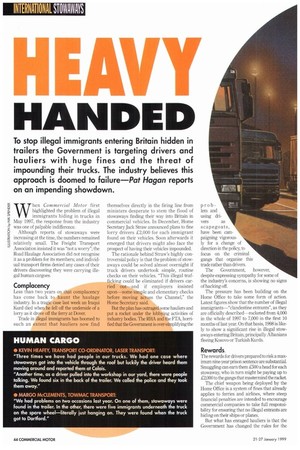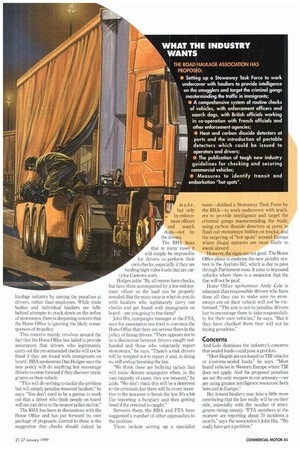HEAVY
Page 46

Page 47

If you've noticed an error in this article please click here to report it so we can fix it.
HANDED
To stop illegal immigrants entering Britain hidden in trailers the Government is targeting drivers and hauliers with huge fines and the threat of impounding their trucks. The industry believes this approach is doomed to failure—Pat Hagan reports on an impending showdown.
Lien Commercial Motor first highlighted the problem of illegal immigrants hiding in trucks in May 1997, the response from the industry was one of palpable indifference.
Although reports of stowaways were increasing at the time, the numbers remained relatively small. The Freight Transport Association insisted it was "not a worry"; the Road Haulage Association did not recognise it as a problem for its members; and individual transport firms denied any cases of their drivers discovering they were carrying illegal human cargoes.
Complacency Less than two years on that complacency has come back to haunt the haulage industry, In a tragic case last week an Iraqui Kurd died when he fell off the underside of a lorry as it drove off the ferry at Dover.
Trade in illegal immigrants has boomed to such an extent that hauliers now find themselves directly in the firing line from ministers desperate to stem the flood of stowaways finding their way into Britain in commercial vehicles. In December, Home Secretary Jack Straw announced plans to fine lorry drivers £2,000 for each immigrant found on their vehicles. Soon afterwards it emerged that drivers might also face the prospect of having their vehicles impounded.
The rationale behind Straw's highly controversial policy is that the problem of stowaways could be solved almost overnight if truck drivers undertook simple, routine checks on their vehicles. "This illegal trafficking could be eliminated if drivers carried out—and if employers insisted upon—some simple and elementary checks before moving across the Channel," the Home Secretary said.
But the plan has outraged some hauliers and put a rocket under the lobbying activities of industry bodies. The RHA and the FTA, horrified that the Government is over-simplifying the problem and using dri vers as scapegoats, have been campaigning vigorously for a change of direction in the policy, to focus on the criminal gangs that organise this trade rather than drivers.
The Government, however, despite expressing sympathy for some of the industry's concerns, is showing no signs of backing off.
The pressure has been building on the Home Office to take some form of action. Latest figures show that the number of illegal immigrants—"clandestine entrants", as they are officially described—rocketed from 4,000 in the whole of 1997 to 7,000 in the first 10 months of last year. On that basis, 1998 is likely to show a significant rise in illegal stowaways entering Britain, principally Albanians fleeing Kosovo or Turkish Kurds.
Rewards.
The rewards for drivers prepared to risk a maximum nine-year prison sentence are substantial. Smuggling can earn them £500 a head for each stowaway, who in turn might be paying up to L2,000 to the gangs that mastermind the racket.
The chief weapon being deployed by the Home Office is a system of fines that already applies to ferries and airlines, where steep financial penalties are intended to encourage commercial companies to take full responsibility for ensuring that no illegal entrants are hiding on their ships or planes.
But what has enraged hauliers is that the Government has changed the rules for the haulage industry by aiming the penalties at drivers, rather than employers. While trade bodies and individual hauliers are fully behind attempts to crack down on the influx of stowaways, there is deepening concern that the Home Office is ignoring the likely consequences of its policy.
This concern mainly revolves around the fact that the Home Office has failed to provide assurances that drivers who legitimately carry out the recommended checks will not be fined if they are found with immigrants on board. RHA spokesman Dan Hodges says the new policy will do anything but encourage drivers to come forward if they discover immigrants on their vehicle.
"This will do nothing to tackle the problem but will simply penalise innocent hauliers," he says. "You don't need to be a genius to work out that a driver who finds people on board will not just drive to the nearest police station."
The RHA has been in discussions with the Home Office and has put forward its own package of proposals. Central to these is the suggestion that checks should indeed be
made, but only by enforcement officers and search dogs—not by the drivers.
The RHA fears that in many cases it will simply be impossible for drivers to perform their own checks, especially if they are hauling high-value loads that are carrying Customs seals.
Hodges adds: "By all means have checks, but have them accompanied by a law enforcement officer so the load can be properly resealed. But the main issue is what do you do with hauliers who legitimately carry out checks and get found with immigrants on board--are you going to fine them?'
John Hix, campaigns manager at the FTA, says his association has tried to convince the Home Office that there are serious flaws in the policy of fining drivers. "There appears not to be a distinction between drivers caught redhanded and those who voluntarily report stowaways," he says. "There's a risk drivers will be tempted not to report it and, in doing so, still end up breaking the law
"IATe think these are bullying tactics that will make drivers scapegoats when, in the vast majority of cases, they are innocent," he adds. "We don't think this will be a deterrent to the criminals but there will be every incentive to the innocent to break the law It's a bit like reporting a burglary and then getting fined if the criminal is caught."
Between them, the RHA and FTA have suggested a number of other approaches to the problem.
These include setting up a specialist team—dubbed a Stowaway Task Force by the RHA—to work undercover with truckers to provide intelligence and target the criminal gangs masterminding the trade; using carbon dioxide detectors at ports to flush out stowaways hidden on trucks; and the targeting of "hot spots" around Europe where illegal entrants are most likely to sneak aboard.
However, the signs are not good. The Home Office plans to enshrine the new penalty systern in the Asylum Bill, which is due to pass through Parliament soon. It aims to impound vehicles where there is a suspicion that the fine will not be paid,
Home Office spokesman Andy Cole is adamant that responsible drivers who have done all they can to make sure no stowaways are on their vehicle will not be victimised. "The aim is not to penalise drivers but to encourage them to take responsibility for their own vehicles," he says. "But if they have checked them they will not be facing penalties."
Concerns And Cole dismisses the industry's concerns that sealed loads could pose a problem.
Most illegals are not found on TIR vehicles or Customs-sealed loads," he says. "Most board vehicles in Western Europe where TIR does not apply. And the proposed penalties are not the only weapon in our armoury—we are using greater intelligence resources, both here and in Europe," But honest hauliers may take a little more convincing that the law really will be on their side, especially with the number of immigrants rising steeply. "FTA members at the moment are reporting about 70 incidents a month," says the association's John Hix. "We really have got a problem."
















































































































